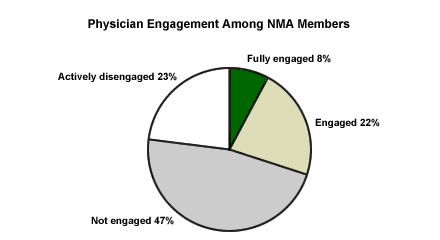Despite perceived progress that minorities have made in professional fields such as medicine, a new ║┌┴¤═° study* suggests that many black physicians generally don't feel attitudinally loyal or emotionally attached to their profession. Only 8% of the black physicians who took part in a recent survey of National Medical Association (NMA) members were found to be "fully engaged" with the practice of medicine.
Meanwhile, about 7 in 10 respondents fell into the "not engaged" (47%) or "actively disengaged" (23%) categories. The figures compare unfavorably with engagement levels for physicians overall in ║┌┴¤═°'s large healthcare database.

"When I talk to my colleagues in the hall, at meetings, in the hospital or even the elevator, our conversations inevitably turn negative when we discuss our profession," says Dr. Natalie Carroll, past president of the NMA Board of Directors and an obstetrician in Houston. "That alarms me."
What Does It Mean to Be "Engaged"?
Physician engagement is the level to which physicians are loyal and emotionally attached to the practice of medicine. ║┌┴¤═° uses 11 question items to measure physician engagement. Items such as, "How likely are you to recommend becoming a doctor to a young friend or associate?", are intended to measure attitudinal loyalty among physicians, while their emotional attachment is tested by asking about their level of agreement with statements such as, "A physician is someone a patient can always trust."
- Fully Engaged -- These physicians are loyal and have strong emotional ties to the medical profession. They support change, welcome new technologies, new services, and new techniques.
- Engaged -- These physicians are not attitudinally loyal, but still have a relatively strong emotional attachment. They are sensitive to the need to constantly improve and innovate the medical services they deliver, but balance the need for these improvements in terms of time commitment and other costs.
- Not Engaged -- These physicians are relatively indifferent to their profession. They tend to be less receptive to providing new technical innovations and services for their patients. Although they do not harbor any negative feelings about the practice of medicine, they are clearly unenthusiastic about it.
- Actively Disengaged -- These physicians demonstrate active emotional detachment and antagonism with the profession. They are unhappy and insist on sharing that unhappiness. These physicians have a negative outlook about their profession, and are unwilling to change to a more positive outlook.
Black physicians are underrepresented in the medical field, making their level of engagement an important health and social issue. Many studies show that compared with the rest of the population, a healthcare gap exists for blacks that is rooted in access to care, cost, and insurance. Many blacks prefer to be served by physicians of their race, and the shortage of black physicians, combined with a low level of engagement among black physicians, further aggravates that healthcare gap.
Among the 70% of survey respondents from the medical profession who are not engaged or are actively disengaged, such variables as age, type of practice, or region of the country were not factors in the level of disengagement.
Bottom Line
Founded in 1895 as an alternative association for black physicians who were denied access to more mainstream medical associations, NMA is again adopting a pioneering role as one of the first organizations to study the problems in the relationship of its members to their practices and the medical profession in general.
Dr. Sharon Allison-Ottey, head of NMA's research committee and chief investigator of this survey says, "We face huge obstacles every day -- increasing paperwork, decreasing revenues, skyrocketing costs of everything from malpractice insurance to equipment. But yet, we continue to take care of the patients, often at a great personal loss. Our physicians wake up every morning and face the music that the medical profession is playing. We need to change the tune immediately or morale will decrease even more."
Allison-Ottey feels the implication this study provides is that highly trained and highly skilled minority physicians are losing patience with a complex healthcare system that often forces their focus from medicine to management, and sends them patients with the highest need and the lowest ability to pay. It's a trend that has a variety of possible consequences for black physicians, including a greater likelihood to retire early, to limit the performance of certain services or procedures, to stop accepting new patients, and to limit the number of low-income patients they serve.
The next article in this series will more closely examine the causes of disengagement among black physicians in the United States -- and its consequences.
*Results are based on mail interviews with 479 past and present NMA members, administered in July and August 2003.